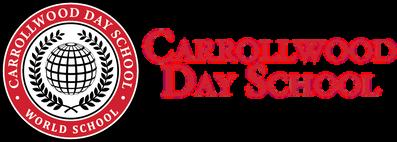

A Guide to Academics at CDS:
COURSES, CURRICULUM, & GRADING
Motto, Vision, & Mission
Overview of Academics at CDS and the IB Curriculum
03 07 08 04 05 06 INDEX
Enrollment Management Philosophy Lower School Curriculum www CDSPATRIOTS org
Middle School Curriculum
Upper School Curriculum & Pathways to Graduation
CARROLLWOOD DAY SCHOOL
Motto, Vision, Mission
Motto
Education with Character
Vision
Build a community prepared and inspired to better the world
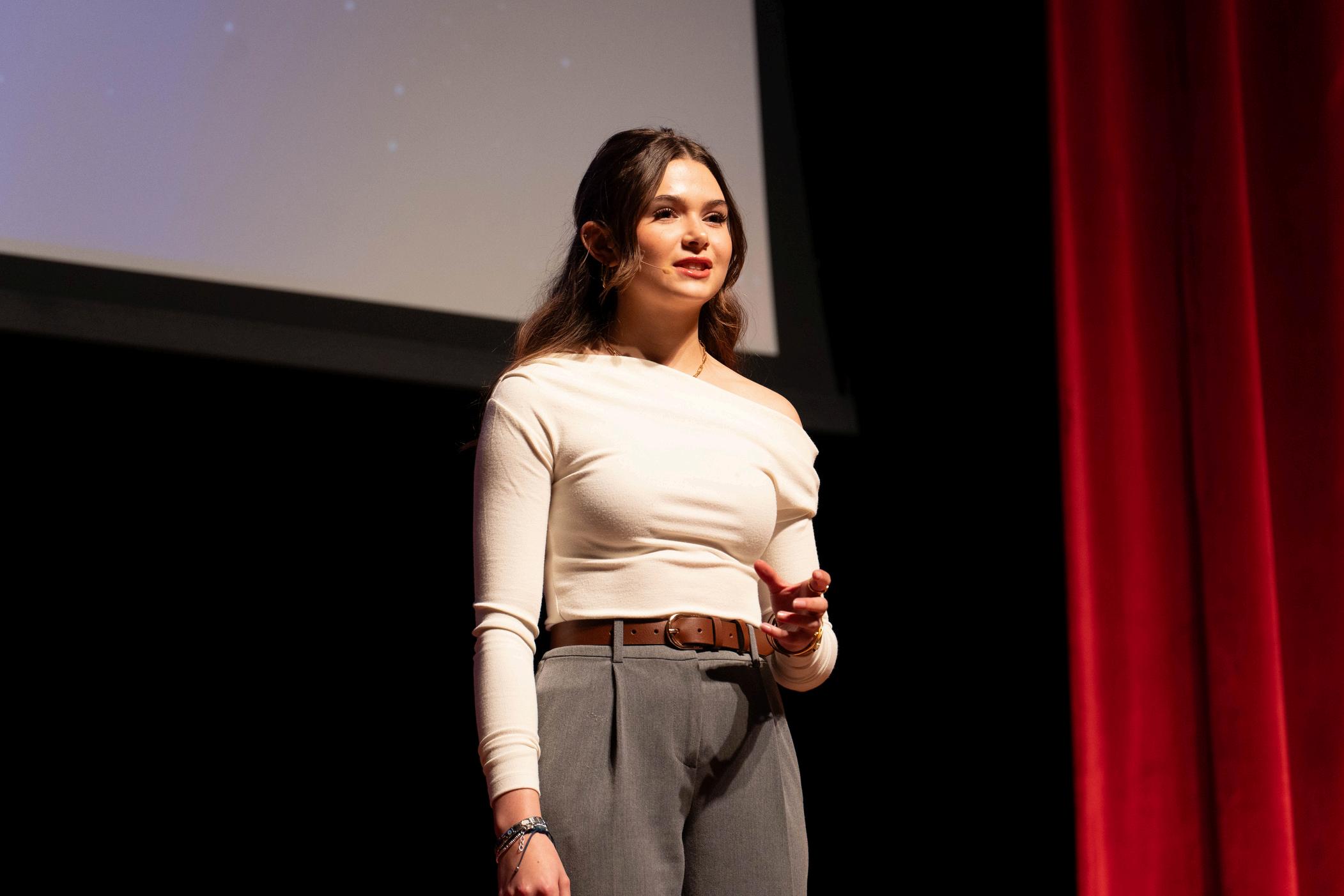
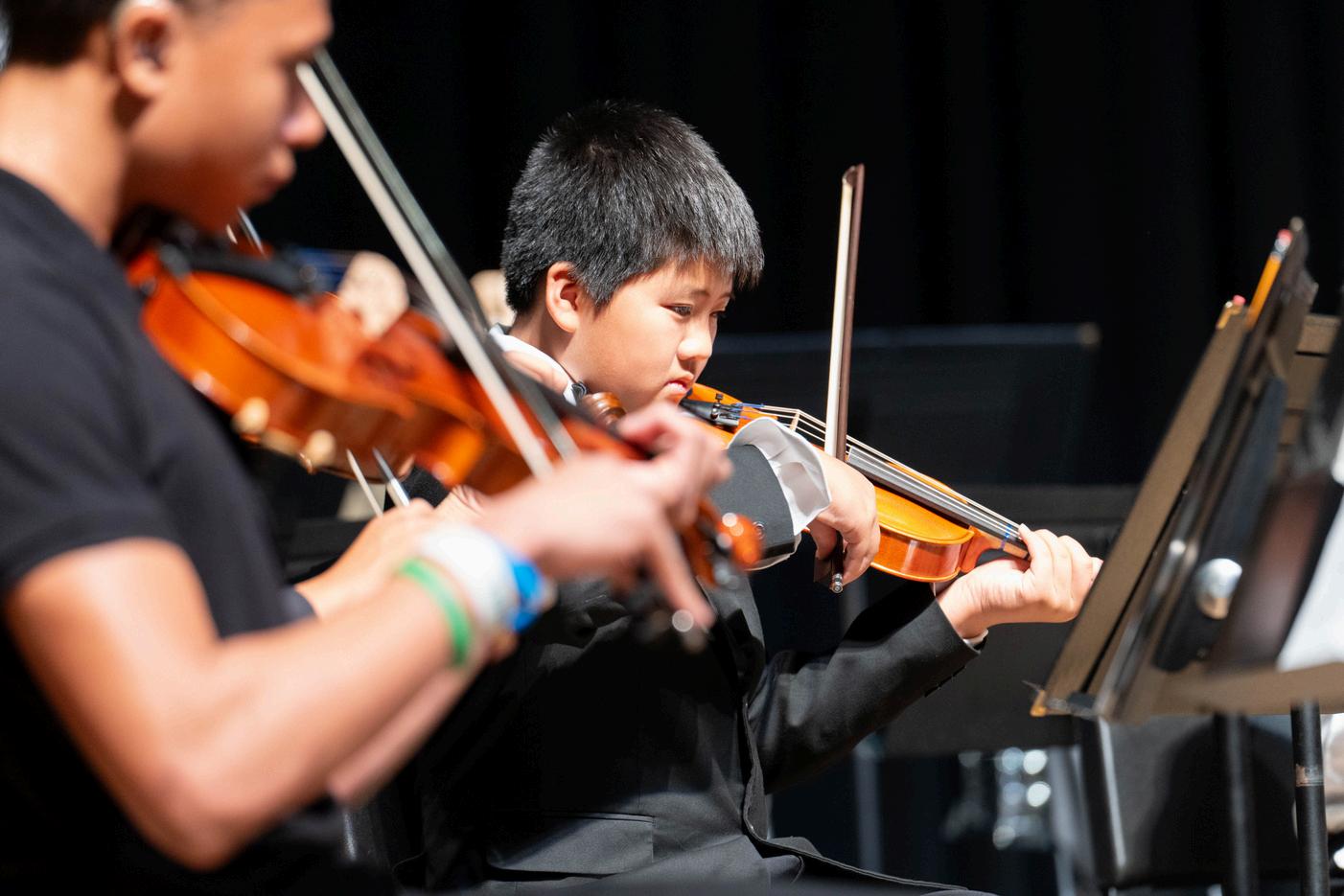
Mission
As an IB World School, we cultivate principled entrepreneurial thinkers for a global society by enriching the mind, strengthening the character, and inspiring the passions of our community
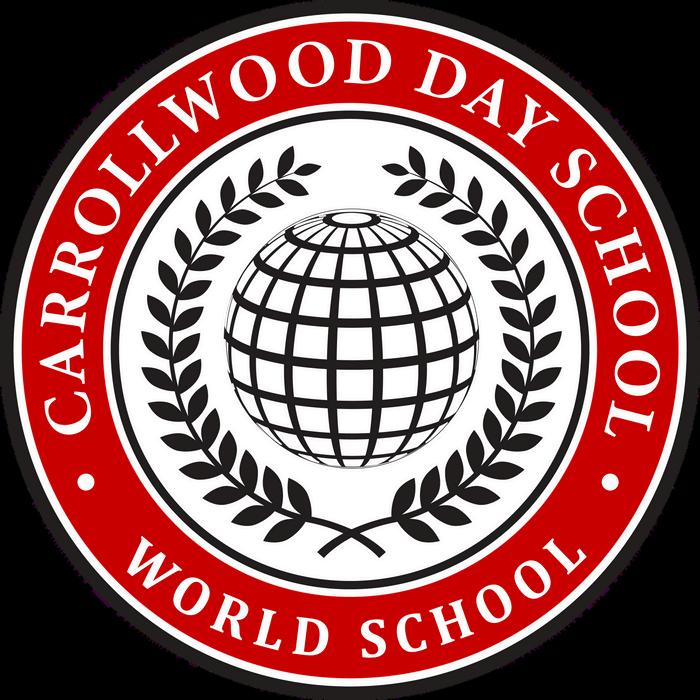
Overview of Academics at CDS & the IB Programme 04
At CDS, academics are rooted in the International Baccalaureate (IB) framework, providing a cohesive and rigorous educational experience from early childhood through graduation. The IB curriculum is woven into all coursework to foster inquiry-based learning, critical thinking, and global-mindedness By integrating IB principles across all divisions, students develop a deep understanding of subject matter while building essential skills such as collaboration, communication, and problem-solving This intentional approach ensures that students are not only prepared for future academic challenges but also equipped with the knowledge and perspective to thrive in an interconnected world

Lower School (PYP - Primary Years Programme) (PYP Primary Programme)
Toddlers - 5th Grade
In the Lower School, students engage in the IB Primary Years Programme (PYP), which nurtures curiosity and a love of learning through inquiry-based exploration The PYP encourages students to ask questions, make connections, and take ownership of their learning while building a strong foundation in core subjects
Middle School (MYP - Middle Years Programme)
6th - 8 Grade th
The IB Middle Years Programme (MYP) in Middle School challenges students to think critically, make real-world connections, and develop independent learning skills Through interdisciplinary learning and project-based assessments, students deepen their understanding of subjects while refining their ability to apply knowledge in meaningful ways
Upper School (MYP & DPDiploma Programme School & -
9 - 12 Grade th th
In the Upper School, students continue the MYP in grades 9 and 10 and then have the opportunity to participate in the IB Diploma Programme (DP) for 11 & 12 grades, a globally recognized curriculum that emphasizes academic rigor, research skills, and personal growth Whether pursuing the full IB Diploma or selecting individual IB courses, students are encouraged to challenge themselves, think independently, and engage in service-learning opportunities that prepare them for college and beyond. th th
Enrollment Management Philosophy
Carrollwood Day School welcomes all prospective applicants and families. The school seeks to admit those students who show the potential to grow significantly while at CDS. Students must be academically on or above grade level.
The core characteristics that follow are those that the admissions process seeks to identify and select in its students and families
Students who demonstrate the academic ability and/or developmental readiness to succeed in a leading college preparatory program
Students whose talents match and enrich the school program.
Students whose personal qualities suggest they will contribute in meaningful ways to school and community life.
Students who further the school’s commitment to reflect the diversity of the community in all of its forms
Parents who demonstrate an awareness of and commitment to meet the school’s expectation of parental cooperation and support
Families who are able to support the school through contributions of their time, talent, and resources

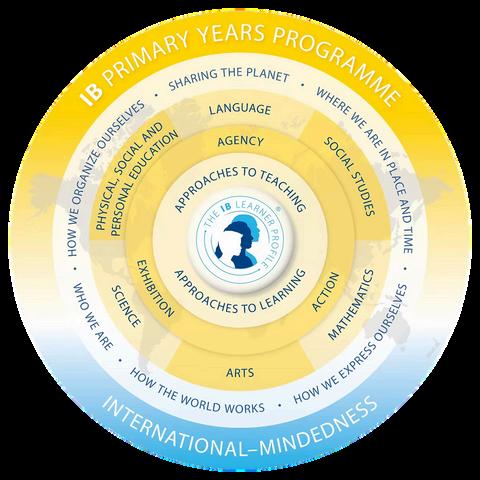
Lower School Curriculum
IB
LOWER SCHOOL | TODDLERS - 5 GRADE T H
Welcome to the Primary Years Programme (PYP)
Overview
The Primary Years Programme at Carrollwood Day School focuses on the idea that students’ learning is based on experiences and prior knowledge. Structured inquiry, along with guided and open inquiry methods are used in the classroom
Teachers structure learning experiences that ignite curiosity and have students search for knowledge and understandings
Students learn from local, national, and international examples and resources.
PYP at a Glance
The PYP has six overarching themes that have global significance, which allow students to explore human commonalities
The themes are transdisciplinary, which means they integrate the knowledge, skills, and concepts from different subject areas to make learning more meaningful and relevant.
Where we are in place & time
Who we are
How we express ourselves
How the world works
How we organize ourselves
Sharing the planet
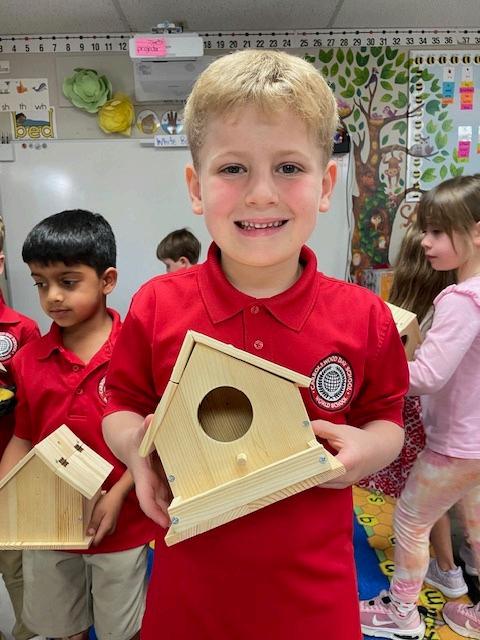
"The PYP focuses on the development of the whole child as an inquirer, both in school and in the world beyond."
LOWER SCHOOL | TODDLERS - 5 GRADE T H
The IB Learner Profile in Lower School:
Nurturing Essential Qualities
In the Lower School at CDS, the IB Learner Profile serves as a guiding set of ideals that inspire and motivate the work of students, teachers, and the entire school community These ten Learner Profiles represent a holistic view of the qualities of an internationally-minded person – qualities that are crucial for success in the 21st century and for making a positive impact on the world
Inquirers
Knowledgeable
Thinkers
Communicators
Principled
Open-minded
Caring
Risk-takers
Balanced
Reflective
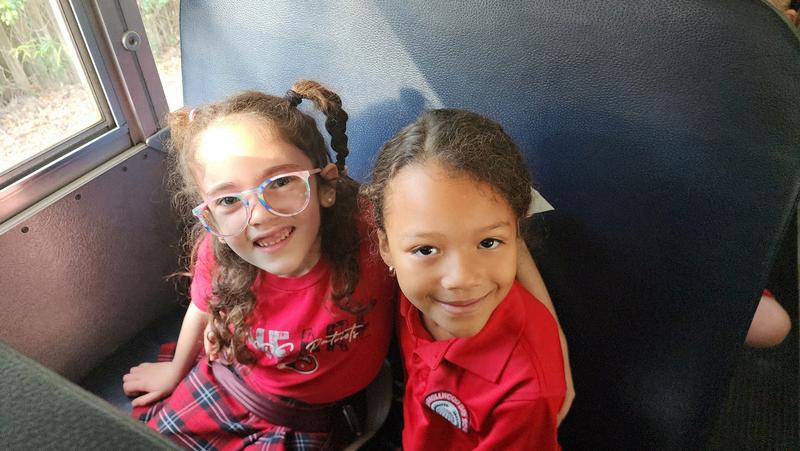
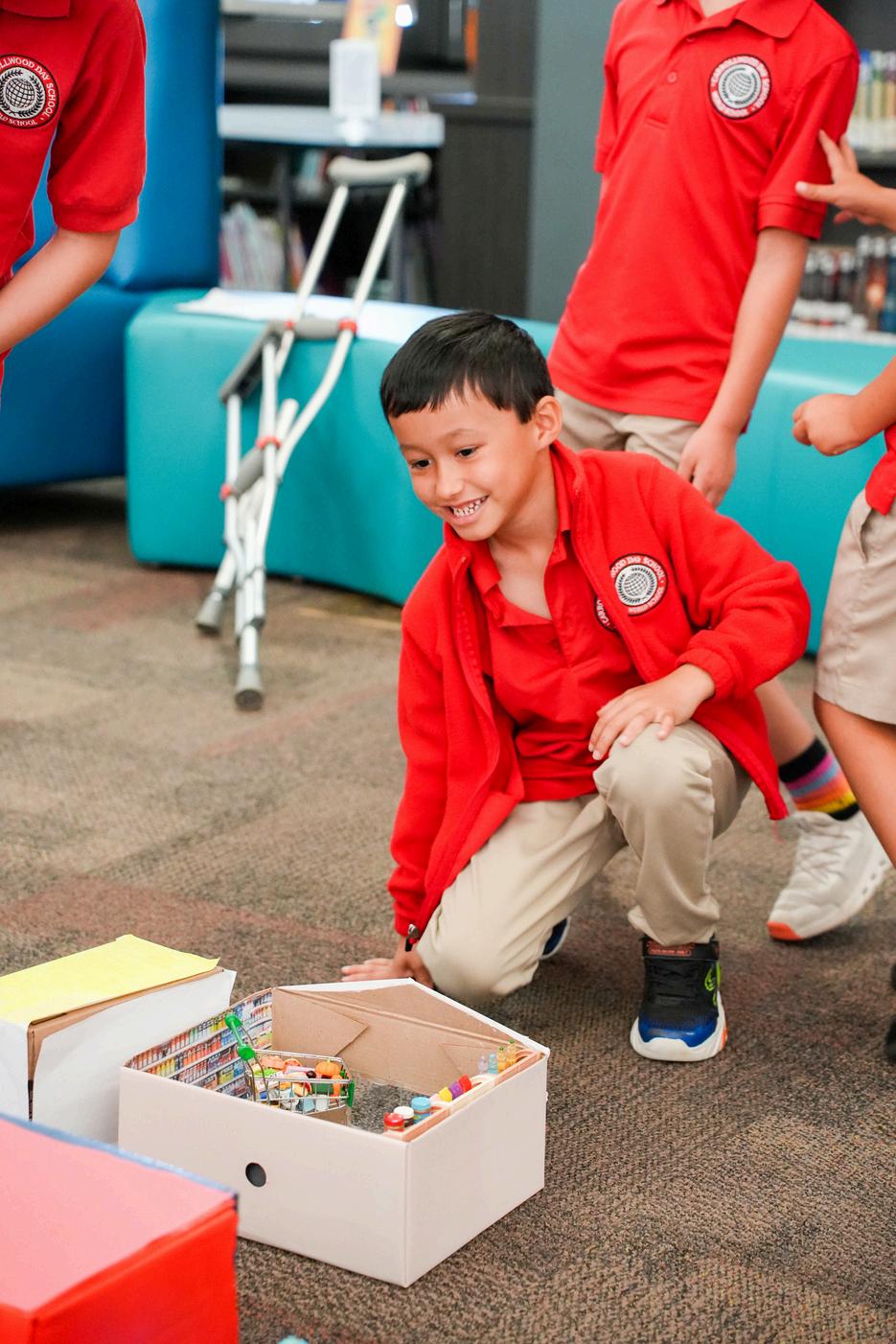
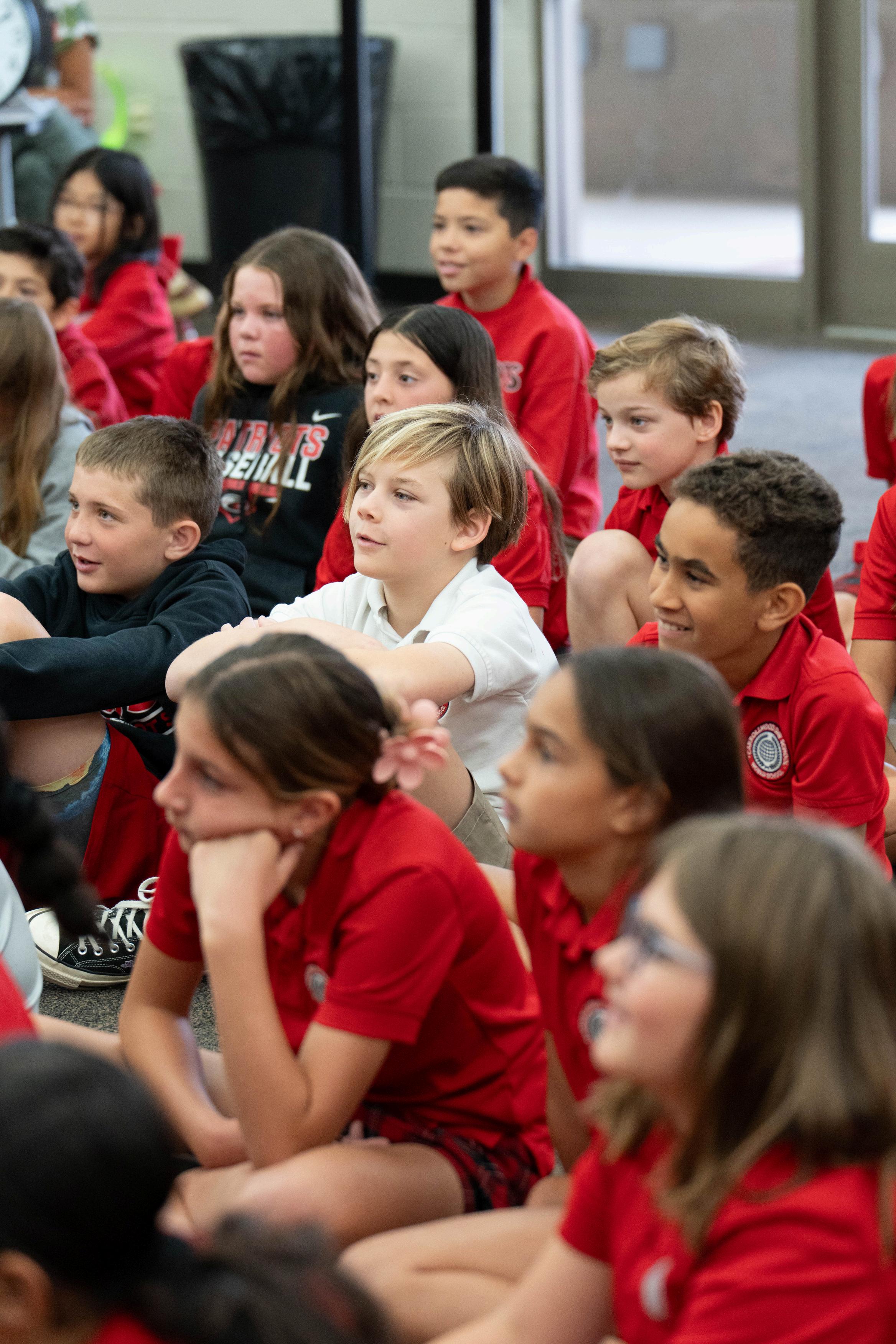
EARLY CHILDHOOD CAMPUS | TODDLERS - KINDERGARTEN
Key Elements and Approaches at ECC
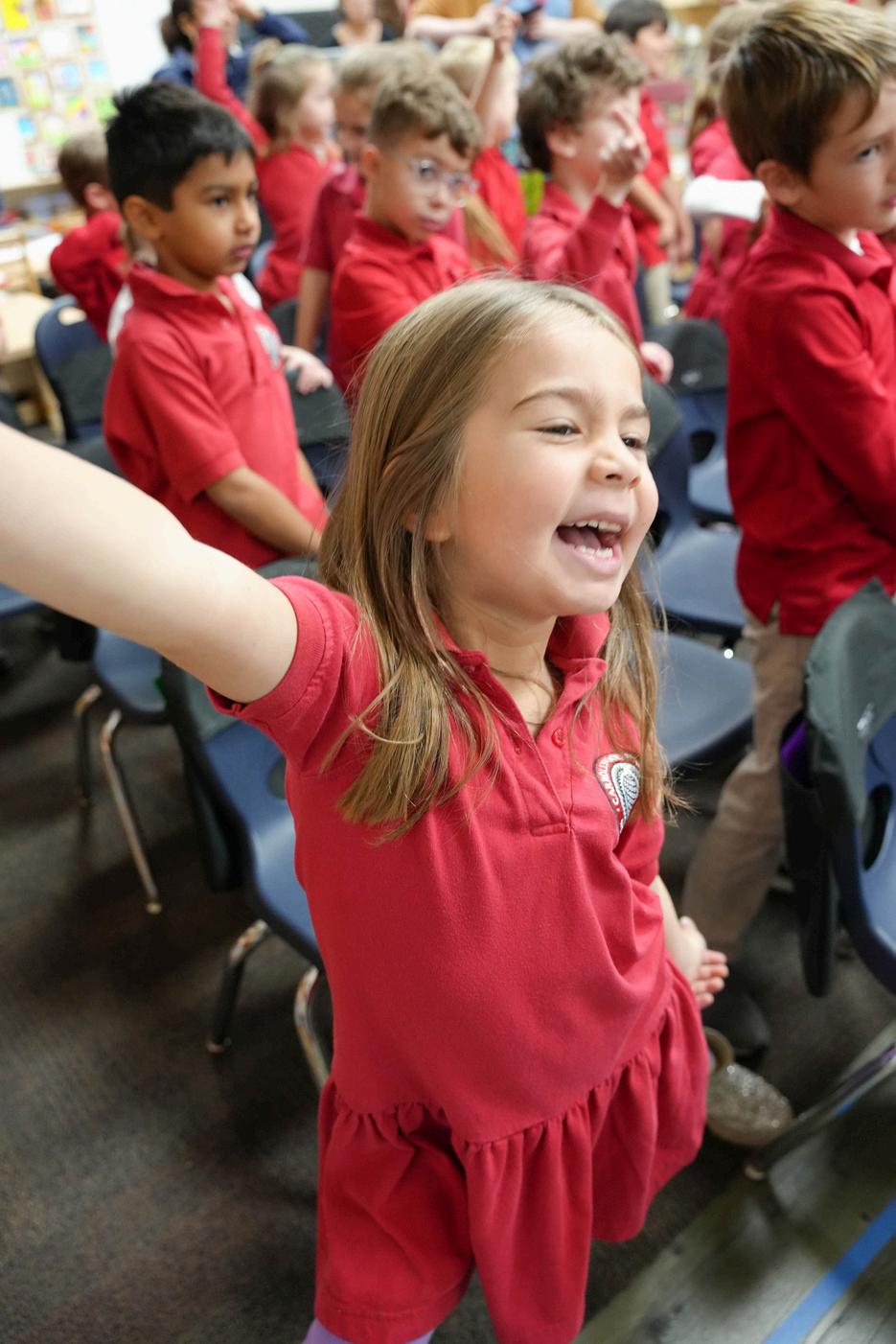
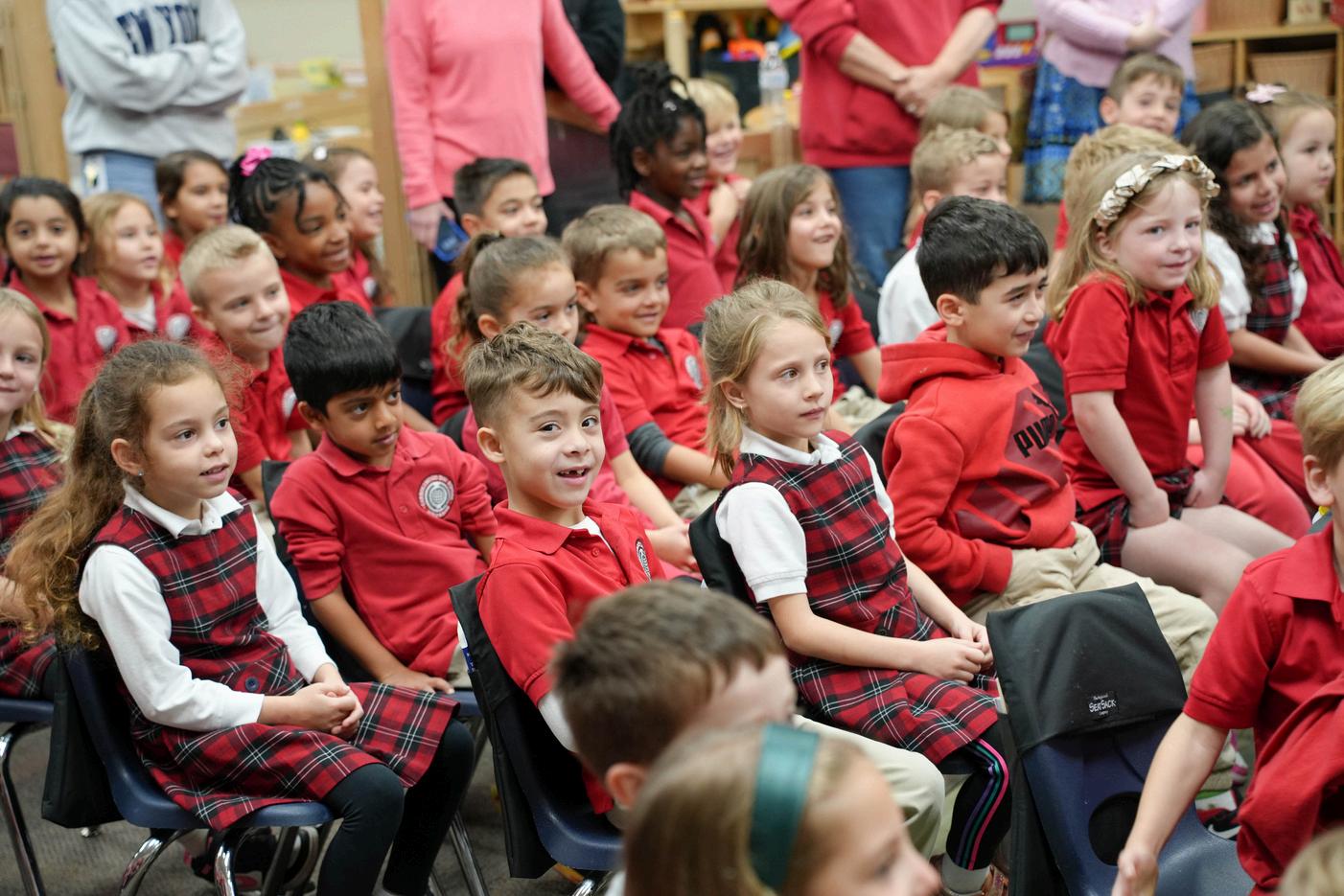
Sensory Exploration
Engaging touch, sight, sound, smell, d f f d i l
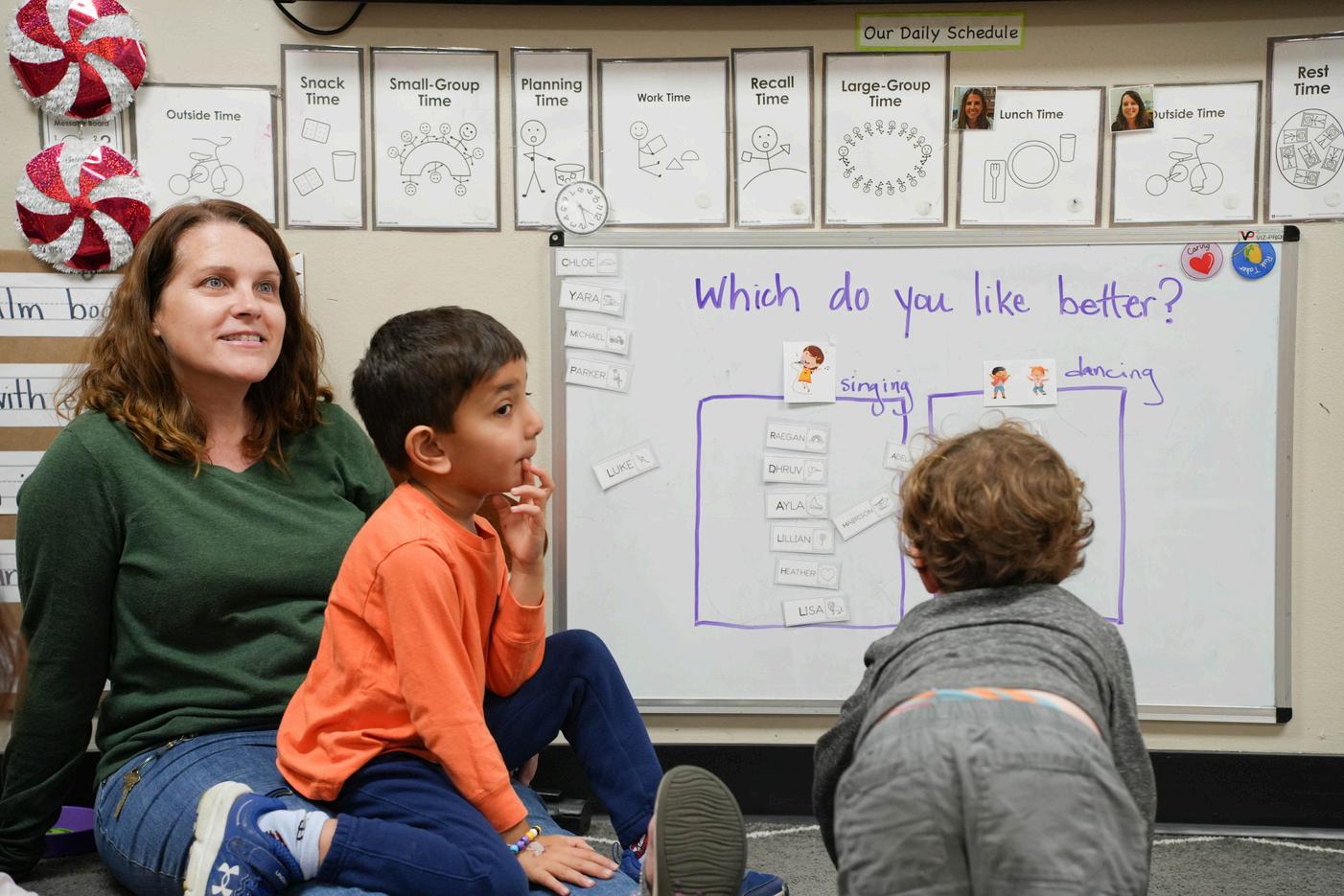
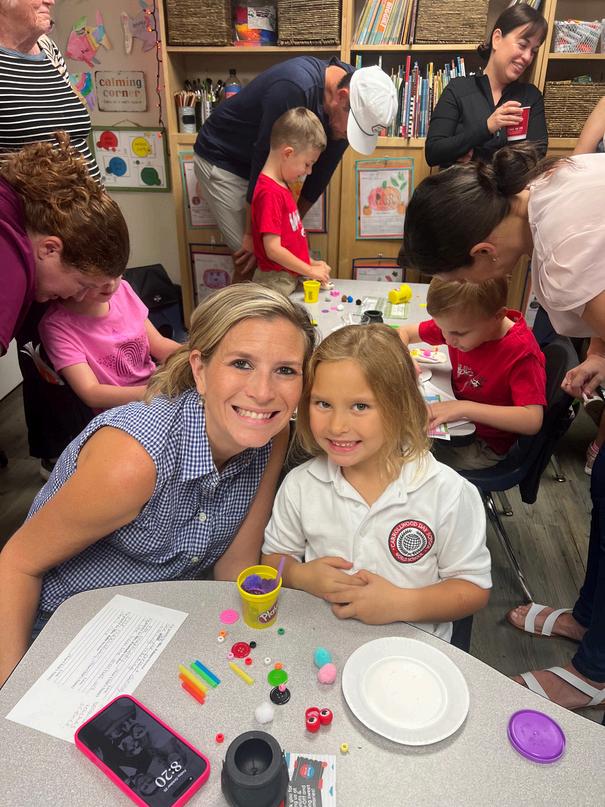
Fostering a love for language through shared reading, storytelling, phonological awareness, and emergent writing p hy, cooperation, and conflict resolution skills for positive interactions and well-being
Connections to the PYP Themes (Early Introduction)
ECC activities introduce PYP themes (Who We Are, Where We Are, etc.) through play and exploration, building a foundation for later, deeper thematic learning
ELEMENTARY SCHOOL | GRADES
1 - 5
Key Elements and Approaches in the Elementary School
The Six Transdisciplinary Themes: Curriculum organized around six global themes to provide a framework for inquiry and connect learning across subjects
Units of Inquiry: In-depth explorations of the transdisciplinary themes, driven by a central idea, lines of inquiry, and specified concepts.
Inquiry-Based Learning: Students actively involved in asking questions, researching, analyzing, and constructing understanding through a cyclical process
Conceptual Understanding: Focus on developing deep understanding of powerful organizing ideas (specific concepts) that transcend specific content.
Transdisciplinary Learning: Integration of knowledge and skills from various subject areas within the context of the Units of Inquiry
Development of the IB Learner Profile: Explicitly fostering the ten attributes of the Learner Profile through learning experiences and classroom culture
Connections to the PYP Themes
Agency and Student Voice: Empowering students to take ownership of their learning through choices, questions, and action
Varied Assessment Strategies: Utilizing diverse methods to assess understanding, skills, and the learning process, including self and peer assessment.
The PYP Exhibition (Grade 5): A culminating, collaborative inquiry-based project where students demonstrate their learning and understanding
Action: Encouraging students to reflect on their learning and take responsible action as a result of their inquiries
In Grades 1-5, the six PYP transdisciplinary themes serve as the central organizers for the curriculum. Units of Inquiry are explicitly designed under each theme, providing a framework for in-depth exploration of significant concepts and ideas relevant to the world around the students Learning across all subject areas is integrated within these themes, fostering a holistic and connected understanding of knowledge and its application
Primary Years Programme at CDS
1 2 3 4 5
Inquiry-Driven Learning
The PYP at CDS is built on a foundation of inquiry, where students are encouraged to ask questions, explore their curiosity, and actively construct their own understanding of the world through hands-on investigations and research
Transdiciplinary Approach
Learning transcends traditional subject boundaries through the exploration of six global themes, allowing students to make meaningful connections between different areas of knowledge and develop a holistic perspective
Focus on Conceptual Understanding
The curriculum emphasizes the development of deep understanding of key concepts that are transferable across disciplines and relevant to students' lives, rather than just memorizing facts
Development of the Whole Child
CDS integrates the IB Learner Profile, nurturing students to become wellrounded individuals who are inquirers, thinkers, communicators, risk-takers, knowledgeable, principled, caring, open-minded, well-balanced, and reflective.
Preparation for Lifelong Learning
The PYP at CDS equips students with essential skills, knowledge, and attitudes that foster a love of learning and provide a strong foundation for success in the MYP and beyond, preparing them to be active and engaged global citizens
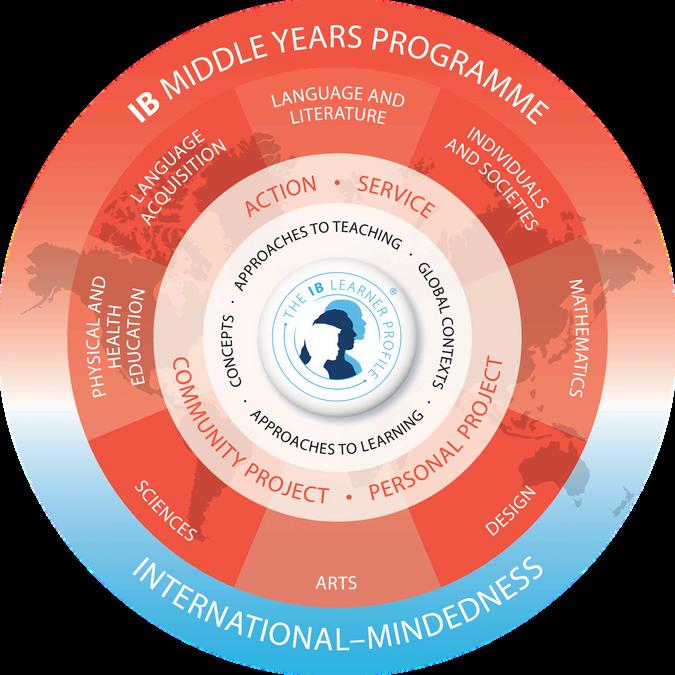
Middle School Curriculum
www CDSPATRIOTS org
MIDDLE SCHOOL | 6 - 8 GRADE
Welcome to the Middle Years Programme (MYP)
Overview
CDS Middle School continues to focus on the whole child, nurturing academic growth through rigorous courses, fostering socialemotional maturity, and maintaining high expectations of character and kindness.
The IB Middle Years Programme (MYP), teaches our students to think critically and ask fundamental questions The engine driving the MYP through every class moves on the belief that all students can be taught strong applicable skills to independently solve real-world problems The learning environment challenges them to strive for their personal best and develop a passion for learning
MYP at a Glance
The Middle Years Programme (MYP) at CDS is a challenging and engaging framework for 6th - 10 graders, designed to foster intellectual curiosity, critical thinking, and a sense of global citizenship Through a balanced curriculum, inquiry-based learning, and a focus on real-world connections, the MYP prepares students to become active learners and responsible individuals ready for the rigors of the IB Diploma Programme and beyond
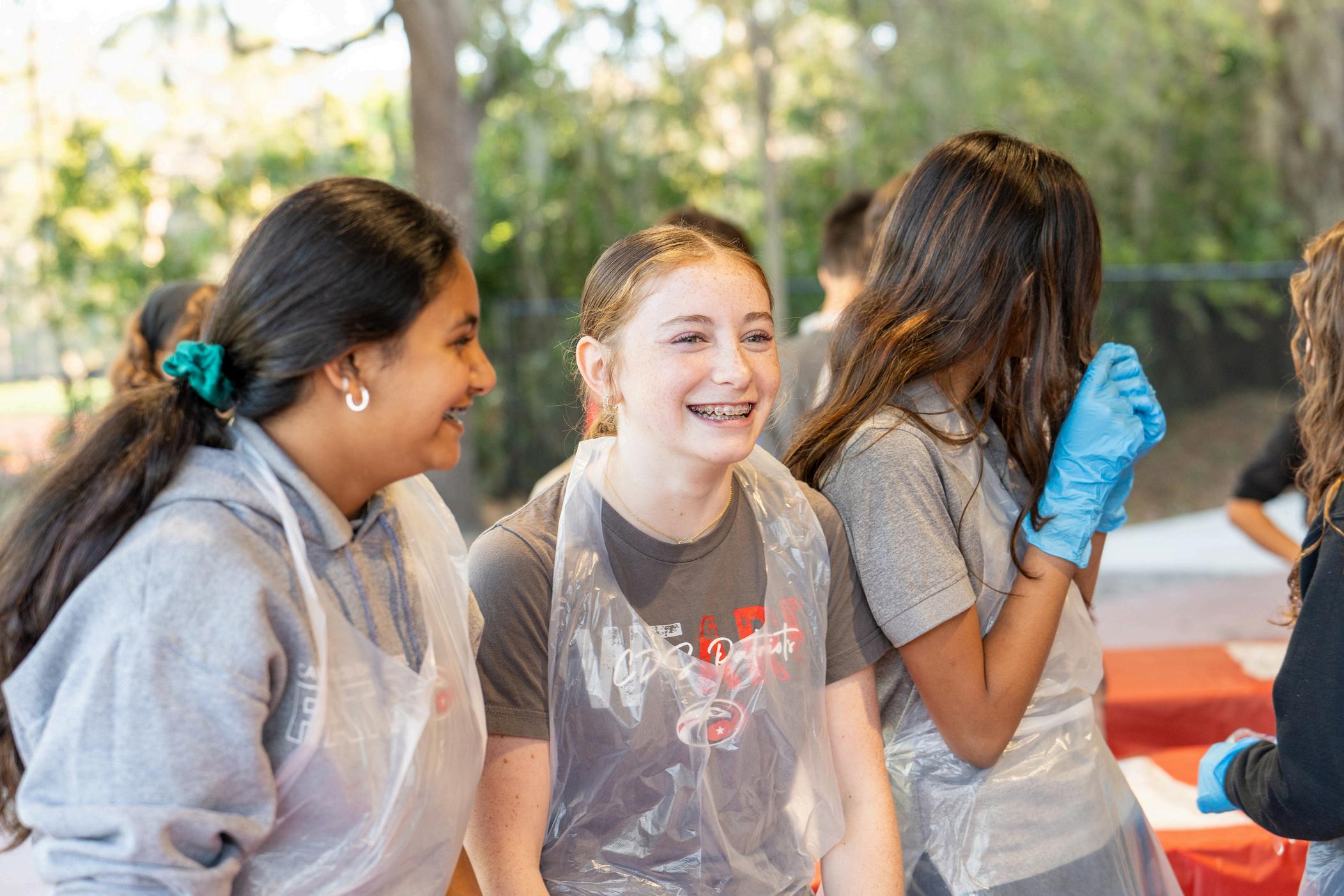
Eight Subject Groups
Global Contexts
Approaches to Learning (ATL)
Conceptual Understanding
Community Engagement
MYP Projects (community & personal)
Criterion-Related Assessment
MIDDLE SCHOOL | 6 - 8 GRADE T H T H
07 Middle School At-a-Glance
Daily Schedule
Students take eight classes, with four classes every day The blocks rotate, so classes are offered at different times during the day Breaks, advisory, and divisional assemblies are built into the school day
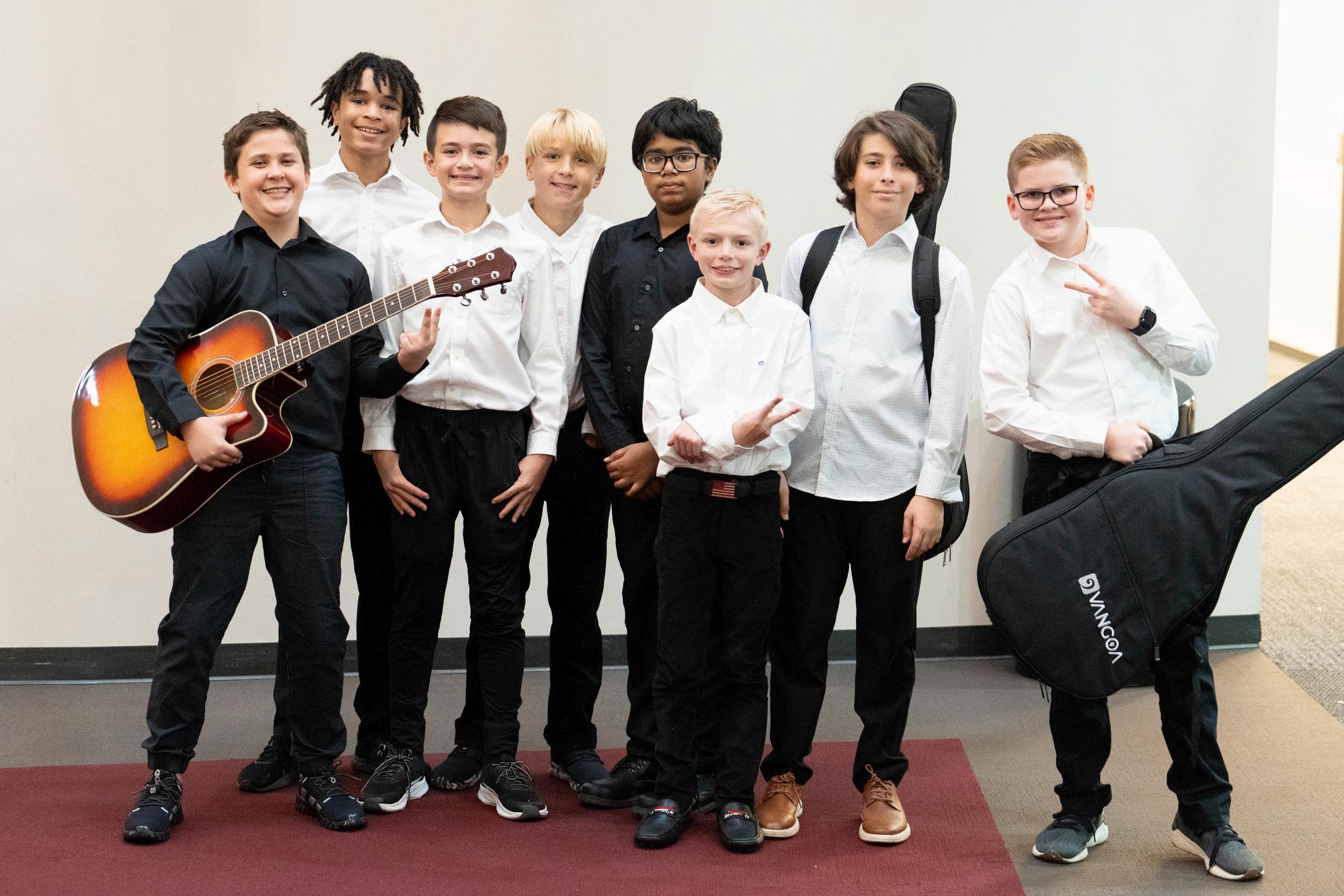
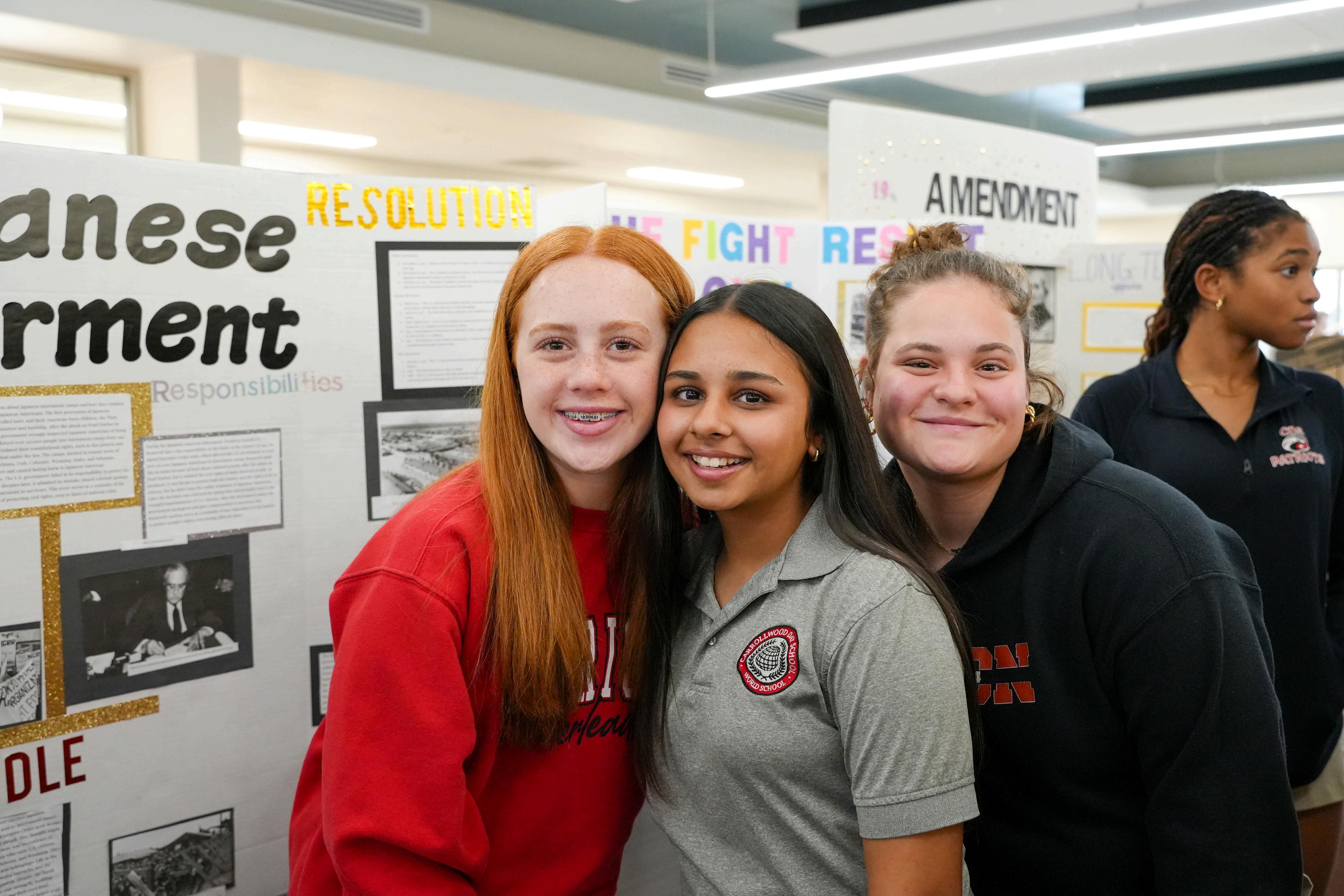
MIDDLE SCHOOL | 6 - 8 GRADE T H T H
07 Middle School At-a-Glance
All classes offered in the middle school are at the honors level
Sixth Grade
Language and Literature
Language Acquisition
Humanities
Sciences
Math
IB MYP Language and Literature Year 1
IB MYP French Year 1
IB MYP Spanish Year 1
IB MYP World History
IB MYP Earth Science
IB MYP Math 6
IB MYP Advanced Math
IB MYP Pre-Algebra Extended
Seventh Grade
IB MYP Language and Literature Year 2
IB MYP French Year 2*
IB MYP Spanish Year 2*
IB MYP Geography and Civics
IB MYP Life Science
IB MYP Pre-Algebra
IB MYP Pre-Algebra Extended
IB MYP Algebra I Extended
Design
IB MYP Design Technology
IB MYP Computer Science
IB MYP Visual Arts I
Eighth
Grade
IB MYP Language and Literature Year 3
IB MYP French Year 3*
IB MYP Spanish Year 3*
IB MYP U S History
IB MYP Physical Science
IB MYP Algebra I
IB MYP Algebra I Extended
IB MYP Geometry Extended
IB MYP Digital Art
IB MYP Visual Arts I
Visual Arts
IB MYP Visual Arts I
IB MYP Theatre
Performing Arts
IB MYP Musical Theatre
IB MYP Dance
IB MYP Band
Music
IB MYP Guitar
IB MYP Orchestra
Physical and Health
Education
IB MYP Physical and Health Education - Year 1
IB MYP Visual Arts II/III Digital and Applied Arts
IB MYP Theatre
IB MYP Musical Theatre
IB MYP Dance
IB MYP Band I/II
IB MYP Guitar
IB MYP Orchestra
IB MYP Physical and Health Education Year 2
IB MYP Visual Arts II/III
Digital and Applied Arts
IB MYP Theatre
IB MYP Musical Theatre
IB MYP Dance
IB MYP Band I/II
IB MYP Guitar
IB MYP Orchestra
IB MYP Physical and Health Education Year 3
Middle School At-a-Glance
MYP Grade Conversion
2 7 60-62 F 1 0 0 Under 60
07
Produces high-quality, frequently innovative work. Communicates a comprehensive, nuanced understanding of concepts and contexts. Consistently demonstrates sophisticated critical and creative thinking Frequentlytransfers knowledge and skills with independence and expertise in a variety of complex classroom and real-world situations
Produces high-quality, occasionally innovative work Communicates extensive understanding of concepts and contexts Demonstrates critical and creative thinking, frequentlywith sophistication Uses knowledge and skills in familiar and unfamiliar classrooms and real-world situations, often with independence
Produces generally high-quality work Communicates a secure understanding of concepts and contexts Demonstrates critical and creative thinking, sometimes with sophistication Uses knowledge and skills in familiar classroom and realworld situations and, with support, some unfamiliar real-world situations
Produces good-qualitywork Communicates a basic understanding of most concepts and contexts with few misunderstandings and minor gaps Often demonstrates basic critical and creative thinking Uses knowledge and skills with some flexibility in familiar classroom situations but requires support in unfamiliar situations
Produces work of an acceptable quality Communicates a basic understanding of many concepts and contexts, with occasionally significant misunderstandings or gaps Begins to demonstrate some basic critical and creative thinking Is often inflexible in the use of knowledge and skills, requiring support even in familiar classroom situations
Produces work of limited quality. Expresses misunderstandings or significant gaps in understanding of many concepts and contexts. Infrequently demonstrates critical or creative thinking. Generally inflexible in the use of knowledge and skills, infrequently applying knowledge and skills
Produces work of very limited quality Conveys many significant misunderstandings or lacks understanding of most concepts and contexts Very rarely demonstrates critical or creative thinking. Very inflexible, rarely using knowledge or skills
5 KEY TAKEAWAYS ABOUT THE
Middle School Middle Years Programme at CDS
1 2 3 4 5
Exploration Through Inquiry
Middle school students learn through questions, projects, and hands-on experiences that spark curiosity and help them connect learning to the world around them
Balanced Academic and Character Development
The MYP in Grades 6–8 nurtures both academic growth and personal values, helping students develop empathy, resilience, and a strong sense of self
Global Thinking
In middle school, students explore global contexts like culture, identity, and sustainability which encourages them to see beyond themselves and think like global citizens
Approaches to Learning (ATL) Skills
Students begin building essential skills such as time management, collaboration, self-advocacy, and reflection tools they’ll use throughout their academic journey and life.
Student Voice and Choice
From interdisciplinary units to creative assessments, students in the MYP have opportunities to express themselves and make choices in how they demonstrate learning

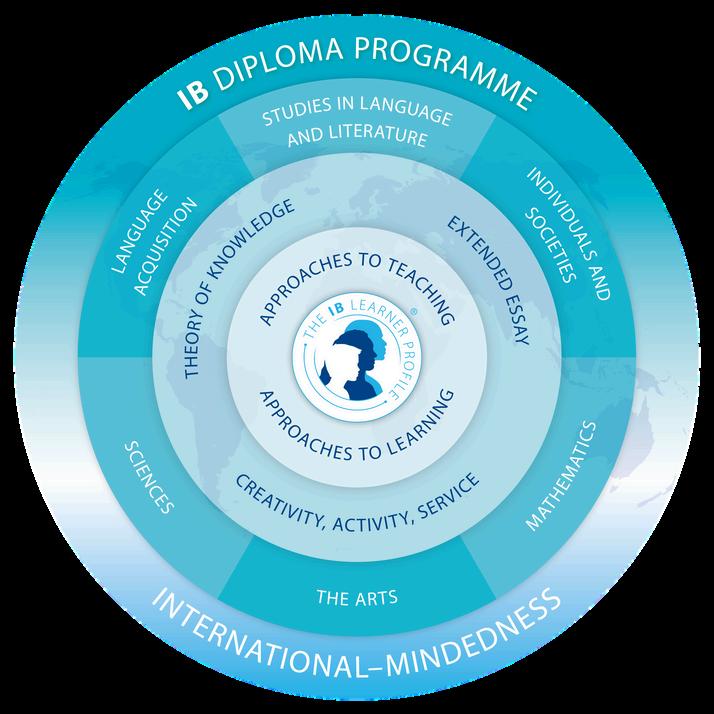
Upper School Curriculum
IB
Continuing the Middle Years Programme (MYP) & Completing the Diploma Program (DP)
Overview
CDS Upper School continues to nurture the whole child while preparing students for the demands of higher learning As academic expectations rise, students are supported in developing independence, resilience, and a strong sense of purpose.
The IB Middle Years Programme (MYP) in Grades 9 and 10 challenges students to think critically, make interdisciplinary connections, and apply their learning to real-world problems The Personal Project encourages students to explore a personal interest and demonstrate initiative, creativity, and perseverance.
In Grades 11 and 12, the IB Diploma Programme (DP) offers a rigorous and balanced curriculum recognized worldwide Through in-depth coursework, independent research, and community engagement, CDS students graduate with the skills, confidence, and perspective needed for success in college and beyond.
Student Course Load
Students are generally expected to take five courses in the areas of English, Mathematics, Science, Humanities, and World Languages per year and at least one other elective course per semester Students who wish to take less than the
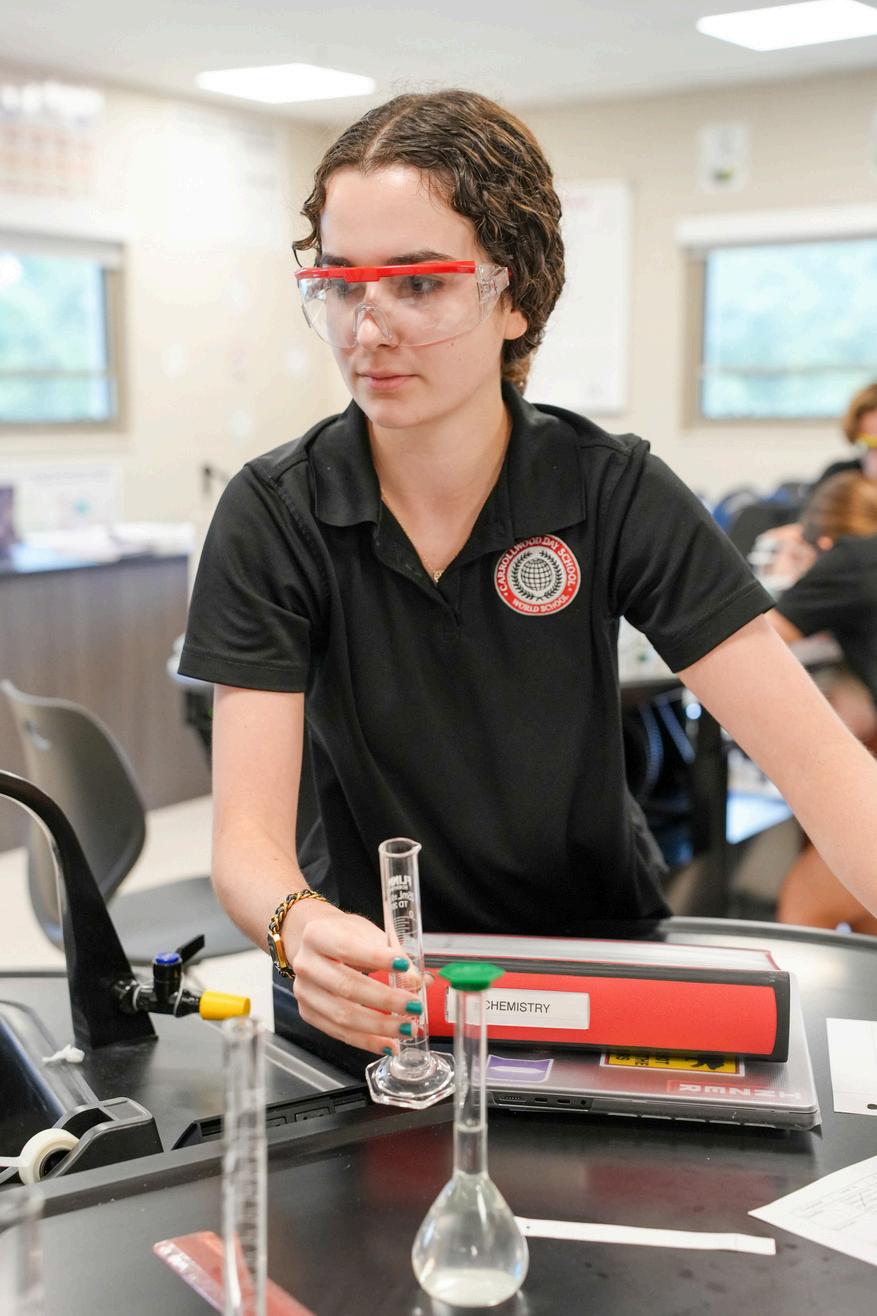
minimum course load need prior permission from an upper school administrator. The normal load would include six to eight courses each semester, depending on the student’s academic trajectory
CDS Pathways to Graduation
Rising CDS juniors should select one of the three graduation pathways below that align with their competitive best fit for college admissions Choice should be based on personal interests, academic aptitude, and college ambitions.
CDS GRADUATE
Rigorous
Limited IBDP Courses and CDS Honors Courses
IBexamsnotrequired CDSfinalexamsrequired IBCorenotrequiredwhich allowsformoreflexibilityin courseselection
GPA,SAT/ACTtestscores& servicehoursdetermine FloridaBrightFutures Scholarshipeligibility
CDS
+ IB COURSE
CANDIDATE
Combination of IBDP Courses and CDS Honors Courses
OptiontositforselectIBexams andmayreceivecollegecredit (CDSfinalexamforanysubject nottesting)
IBCorenotrequiredwhichallows formoreflexibilityincourse selection
GPA,SAT/ACTtestscores& servicehoursdetermineFlorida BrightFuturesScholarship eligibility
Six IBDP Courses, IB Core Requirements + IB exams
Samesixsubjectsfortwoyears, limitedflexibilityincourse selection
IBexamsinallsixsubjects(3 HigherLevel,3StandardLevel)
AwardofIBDiplomaand100+ servicehoursentitlesstudentto receivetoptierofFloridaBright FuturesScholarship
Possiblecollegecredit, dependingonuniversity,forIB examscores
Students should select a graduation pathway that fits their personal interests, academic aptitude & college ambitions It is in the best interest of students to follow a pathway that is challenging enough without jeopardizing a student’s cumulative grade point average (GPA) as colleges weigh GPA and Rigor of Schedule similarly in the admissions process. Carrollwood Day School has various resources available during the selection process to assist families in choosing the right pathway for their student, including the IB Diploma Programme Coordinator, the College Counseling staff, Department Chairs and teachers
Upper School At-a-Glance
Possibility of Internships During the Normal School Day
opportunities outside of school such as internships and jobs
UPPER SCHOOL | 9 - 12 GRADE T H T H
08 Upper School At-a-Glance
Daily Schedule
Students take eight classes, with four classes every day The blocks rotate, so classes are offered at different times during the day Breaks, advisory, and divisional assemblies are built into the school day
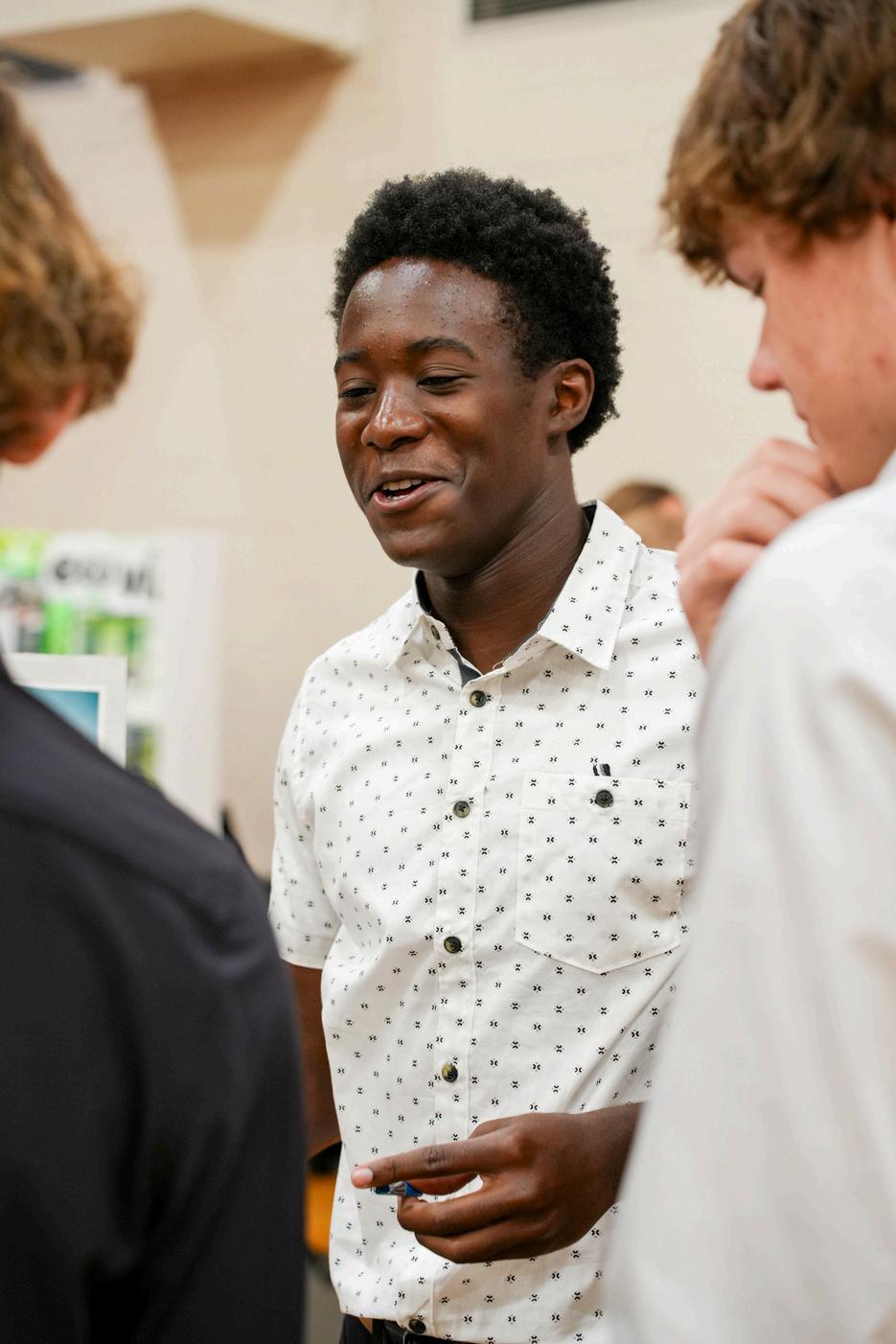

Upper School At-a-Glance
MYP Grade Conversion
2 7 60-62 F 1 0 0 Under 60
08
Produces high-quality, frequently innovative work. Communicates a comprehensive, nuanced understanding of concepts and contexts. Consistently demonstrates sophisticated critical and creative thinking Frequentlytransfers knowledge and skills with independence and expertise in a variety of complex classroom and real-world situations
Produces high-quality, occasionally innovative work Communicates extensive understanding of concepts and contexts Demonstrates critical and creative thinking, frequentlywith sophistication Uses knowledge and skills in familiar and unfamiliar classrooms and real-world situations, often with independence
Produces generally high-quality work Communicates a secure understanding of concepts and contexts Demonstrates critical and creative thinking, sometimes with sophistication Uses knowledge and skills in familiar classroom and realworld situations and, with support, some unfamiliar real-world situations
Produces good-qualitywork Communicates a basic understanding of most concepts and contexts with few misunderstandings and minor gaps Often demonstrates basic critical and creative thinking Uses knowledge and skills with some flexibility in familiar classroom situations but requires support in unfamiliar situations
Produces work of an acceptable quality Communicates a basic understanding of many concepts and contexts, with occasionally significant misunderstandings or gaps Begins to demonstrate some basic critical and creative thinking Is often inflexible in the use of knowledge and skills, requiring support even in familiar classroom situations
Produces work of limited quality. Expresses misunderstandings or significant gaps in understanding of many concepts and contexts. Infrequently demonstrates critical or creative thinking. Generally inflexible in the use of knowledge and skills, infrequently applying knowledge and skills
Produces work of very limited quality Conveys many significant misunderstandings or lacks understanding of most concepts and contexts Very rarely demonstrates critical or creative thinking. Very inflexible, rarely using knowledge or skills
UPPER SCHOOL | 11 - 12 GRADE
08 Upper School At-a-Glance
DP Grade Conversion Grade
Demonstrates excellent content knowledge and understanding, conceptual and contextual awareness and critical, reflective thinking
Highly effective research, investigation and technical skills are evident, as is the abilityto analyze, evaluate and synthesize qualitative and quantitative evidence, knowledge and concepts to reach valid conclusions or solve problems
Responses are highly insightful accurate clear concise convincing logically structured, with sufficient detail, precise use of appropriate terminology and with appropriate attention to purpose and audience
Responses are creative, effectively use well-selected examples, and demonstrate awareness of alternative points ofview
Demonstrates very good content knowledge and understanding, conceptual and contextual awareness and critical, reflective thinking
Competent research investigation and technical skills are evident as is the ability to analyze, evaluate and synthesize evidence, knowledge and concepts
Responses are mainly accurate, clear, concise, convincing, logically structured, with sufficient detail, using consistentterminology and with appropriate attention to purpose and audience
Responses show creativity, make effective use of examples, demonstrate awareness of alternative points ofview and provide evidence of intercultural understanding
Demonstrates sound content knowledge and understanding, good conceptual and contextual awareness and evidence of critical, reflective thinking
Research, investigation and technical skills are evident and sometimes well developed Analytical ability is evident, although responses may at times be more descriptive than evaluative
Responses are generally accurate clear logically structured and coherent with mainly relevant material, using suitable terminology, and are sometimes well developed
Responses show reasonable creativity, use of examples, awareness of audience and evidence of intercultural understanding
Demonstrates, with some gaps, secure content knowledge and understanding, some conceptual and contextual awareness and some evidence of critical thinking
Research, investigation and technical skills are evident, but not thoroughly developed Analysis is generally valid, but more descriptive than evaluative
The student solves basic or routine problems, but with limited ability to deal with new or difficult situations
Responses are mostly accurate and clear with little irrelevant material There is some ability to logically structure responses with adequate coherence and use of appropriate terminology
Responses sometimes show creativity, and include some awareness of audience and evidence of intercultural understanding
UPPER SCHOOL | 11 - 12 GRADE
Upper School At-a-Glance
DP Grade Conversion continued Grade continued
08
Demonstrates basic knowledge and understanding ofthe content, with limited evidence of conceptual and contextual awareness
Research and/or investigation is evident, but remains undeveloped There is some abilityto comprehend and solve problems
Responses are only sometimes valid and appropriately detailed There is some expression of ideas and organization ofwork and basic use of appropriate terminology, but arguments are rarely convincing
Responses lack clarity and some material is repeated or irrelevant
There is limited creativity, awareness of context or audience and limited evidence of intercultural understanding
Demonstrates little knowledge or understanding of the content, with weak comprehension of concepts and context and little evidence of application
Evidence of research and/or investigation is only superficial
There is little ability to comprehend and solve problems Responses are rarely accurate or valid There is some attempt to express ideas, use terminology appropriate to the subject and organize work, but the response is rarely convincing.
There is very little creativity, awareness of context or audience and little evidence of intercultural understanding
Demonstrates very rudimentary knowledge or understanding of the content, with very weak comprehension of concepts and context
Ability to comprehend and solve problems or to express ideas is not evident
Responses are rarely accurate or valid Organization is lacking to the point that responses are confusing
Responses demonstrate very little to no appreciation of context or audience, inappropriate or inadequate use of terminology, and little to no intercultural understanding
08 Upper School At-a-Glance
Credits and Courses
To graduate from CDS Upper School, a student must earn at least 24 credits and complete all required courses during grades 9 through 12 while earning a grade below D- in no more than five credits or the equivalent (i.e., multiple half-credit courses). All students are encouraged to accumulate more than the minimum 24 credits before graduation through individualized programs designed to meet specific college admission requirements In addition, a student must complete his or her senior year as a full-time student at CDS, enrolled in at least 5 courses Any exception to this policy requires approval from the Head of the Upper School
Language and Literature
Language Acquisition
IB MYP English Honors I
IB MYP English Honors II
IB DP Language & Literature SL & HL I & II
Students must take 4 years of Language and Literature
IB MYP Spanish I, II, III, IV
IB MYP Spanish for Heritage Speakers
IB DP Spanish Ab Initio SL, I, & II
IB DP Spanish SL/HL
IB MYP French I, II, III, IV
IB DP French Ab Initio SL, I, & II
IB DP French SL & HL, I & II
At least a two-year sequence in any language with 3-4 years in the same language
IB MYP World History Honors
IB MYP US History & Government Honors or Extended Honors (AP Test Optional)
One of the following:
IB DP History of Europe SL & HL I & II
Humanities
4
3
3
Mathematics
IB DP Global Politics SL & HL I & II
IB DP Psychology SL & HL I & II
IB DP Business Management SL & HL I & II
IB MYP Economics Honors
IB MYP Algebra I
IB MYP Geometry Standard or Extended
IB MYP Algebra II Standard or Extended
IB MYP Precalculus Honors
IB DP Mathematical Applications & Interpretation SL I and II
IB DP Mathematical Analysis & Approaches SL & HL I and II Non-IB Honors Course
Students must take 4 years of Mathematics 4
Precalculus Honors
Statistics & Probability Honors
Credits and Courses Continued
08 Upper School At-a-Glance
IB MYP Biology Honors
IB MYP Chemistry Honors or Extended Honors
One of the following:
IB MYP Physics Honors or Extended Honors
IB DP Biology SL & HL I & II
IB DP Chemistry SL & HL I & II
IB DP Physics SL & HL I & II
IB DP Environmental Systems & Societies SL I & II
IB DP Physiology & Biomechanics (*aligns to IB DP SEHS)
IB DP Computer Science SL & HL I & II *not a lab science
IB DP Design Technology SL & HL I & II *not a lab science
Non-IB Honors Course
Anatomy & Physiology Honors
Most selective universities require 4 years of enrollment in Science, three must be lab sciences
At least one of the following:
IB MYP Visual Arts: 2D Art
IB MYP Visual Arts: 3D Art
IB MYP Digital Media Creation
IB MYP Visual Arts Photography
Visual & Performing Arts
IB MYP Drama
IB MYP Comprehensive Theater
IB MYP Music (guitar, strings, or piano)
IB MYP Concert Band
IB DP Visual Arts SL or HL I & II
IB DP Theater
IB
SL or HL I & II
At least 5 elective credits. Courses from another group can also serve as elective credit, i.e., two science courses, two arts, four years of music, etc.:
IB MYP Entrepreneurship: Design
IB MYP Entrepreneurship: Principles
IB MYP Computer Science: Principles
IB MYP Computer Science: Game Development/Cyber Security
IB MYP Engineering: Robotics
IB MYP Engineering: Principles Strength & Conditioning
08
Upper School Middle Years Programme at CDS
Grades 9 - 10 9 - 10
1 2 3 4 5
Advanced Skill Development
Students strengthen critical thinking, research, communication, and selfmanagement skills that prepare them for the rigor of the IB Diploma Programme and beyond
Real-World Application
Learning is grounded in global contexts and real-life issues, helping students see the relevance of their education and become more engaged, informed citizens
As a capstone to the MYP, 10th graders complete an independent project based on a personal passion, demonstrating initiative, creativity, and sustained inquiry.
Courses continue to connect across disciplines, encouraging students to ask deeper questions, make meaningful connections, and explore complex ideas from multiple perspectives.
The Personal Project Interdisciplinary and Inquiry-Based Learning Foundation for Future Success
The 9th and 10th grade MYP years provide a strong academic and personal foundation for the challenges of the IB Diploma Programme, college-level work, and lifelong learning
5 KEY TAKEAWAYS ABOUT THE
Upper School Diploma Programme at CDS
Grades 11 - 12 11 - 12
08
1 2 3 4 5
Rigorous College Preparation
The DP offers a challenging academic curriculum that equips students with the depth of knowledge, study habits, and critical thinking skills needed for success in college and beyond
Holistic, Balanced Education
Students take courses across six subject groups and complete the DP core Theory of Knowledge (TOK), the Extended Essay, and Creativity, Activity, Service (CAS) which foster intellectual curiosity, personal growth, and real-world engagement
Global Perspective Research and Writing Skills
The DP encourages students to think internationally, understand multiple viewpoints, and develop a sense of responsibility as global citizens
Through the Extended Essay and internal assessments, students learn how to conduct independent research, synthesize information, and write at a university level.
Highly Regarded by Universities
The DP is recognized worldwide for its rigor and integrity; colleges and universities value CDS DP graduates for their preparedness, work ethic, and ability to thrive in diverse academic environments
www.CDSPATRIOTS.org

